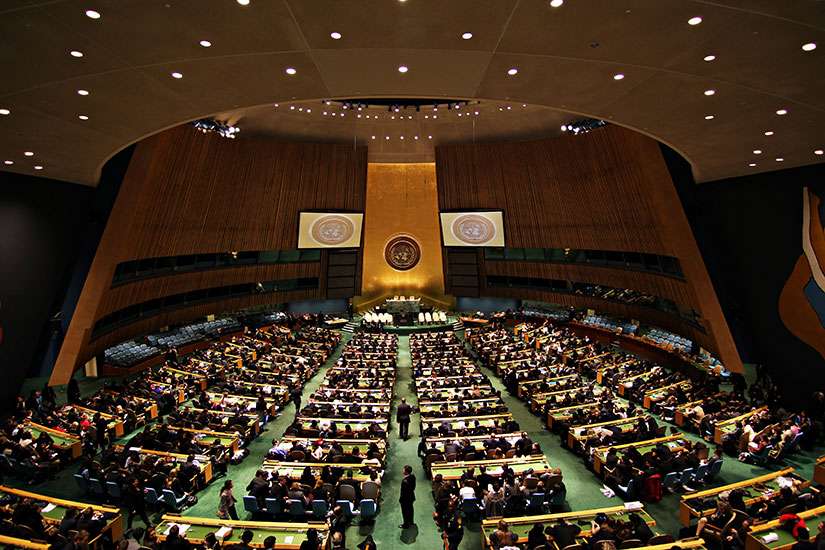"Our network on the ground lends credibility to what we say," said Archbishop Bernardito Auza.
As a nonvoting member since 1964, the Vatican maintains total neutrality and equal friendship with all nations, with an "overall goal of bringing the leaven of the Gospel and the Church's own experience of humanity to the complex reality of international relations and debates about the problems our world faces," he said.
The Philippines-born Auza, 55, was named to the post July 2, succeeding Archbishop Francis Chullikatt. He arrived in New York in early September from Haiti, where he had served as papal nuncio since 2008. Before that, he was at the Vatican's UN mission from 2006 to 2008. Since joining the Vatican diplomatic corps in 1990, he has worked in Madagascar, Bulgaria, Albania and the Vatican Secretariat of State. The archbishop spoke with Catholic News Service March 3 in his office in Manhattan.
"The Holy See's presence is an expression of its high esteem for the United Nations," Auza said. "The United Nations may have its shortcomings, but the Holy See still believes that it remains the depository, so to speak, of the ideals of peace and harmony among all peoples of the world."
The Vatican exercises the right to participate in the debate of the General Assembly; the right to make interventions; the right of reply; the right to have its communications issued and circulated directly as official documents of the assembly; and the right to co-sponsor draft resolutions and decisions that make reference to the Holy See. It is a party to international agreements as diverse as the Vienna Convention on Diplomatic Relations and the Treaty on the Non-Proliferation of Nuclear Weapons.
Auza said the Vatican is a moral authority, or "soft power," that can influence behaviour and provide an authoritative voice to address "the root causes upon which international terrorism feeds."
"The Holy See believes that the dehumanizing impact of the ongoing, escalating use of terror by non-state actors is an urgent call for all states to commit to defeat such terrorist groups which represent a fundamental threat to our common humanity," he said.
"Many of the causes that breed terrorism are evident, like the gangrening situation of oppression and persecution, extreme poverty and the sociocultural alienation of young or first-generation immigrants in Western countries. The Holy See and the Catholic Church not only have a voice, but the resources in these areas," Auza said.
This includes collaboration with governmental and civil groups to enhance sociocultural integration of immigrants, and condemnation of those who seek to detach faith from reason and use it as a justification for violence and extremism, he said.
Pope Francis has never been "so humanly sad and angry" as at the current kidnappings and killings in the Middle East, Auza said.
"Unfortunately, the UN has not come up with any concrete solutions. Political differences underlie the seeming inaction. Until the international community finds a way to stop the violence, we will expect more to come," he said.
The Vatican also is making a moral argument against the possession and use of nuclear weapons in the current discussion of the "unfulfilled" nonproliferation treaty, Auza said.
"The bargain is for nuclear weapons states to gradually disarm in exchange for non-nuclear-weapon states refraining from acquiring nuclear arms," he said, but "not only have the nuclear weapons states not disarmed, they have modernized their weapons.
"We also know that others have acquired them. This is disheartening. There is no reciprocal encouragement. There are new projects that are detrimental and contradictory to the treaty."
Auza said permanent nuclear deterrence jeopardizes the process of nuclear disarmament and nonproliferation. As a moral authority and a party to the UN treaty, the Vatican will continue to press for its implementation, while also recruiting religious and moral experts in the United States to raise consciousness and awareness of the issue, he said.
When Pope Francis visits the United Nations in September, he will likely focus on poverty and development, which he addressed during his January visit to the Philippines, Auza said. Both are being discussed at the UN as programmatic goals for the next 15 years.
The biggest challenge of the Vatican's UN mission is to remain faithful to its primary vocation and "communicate the millennial experience of the Catholic Church to humanity and put this experience at the disposal of the United Nations. It is a challenge to consistently reaffirm to a changing world the values of the Holy See on certain moral and social issues," Auza said.


